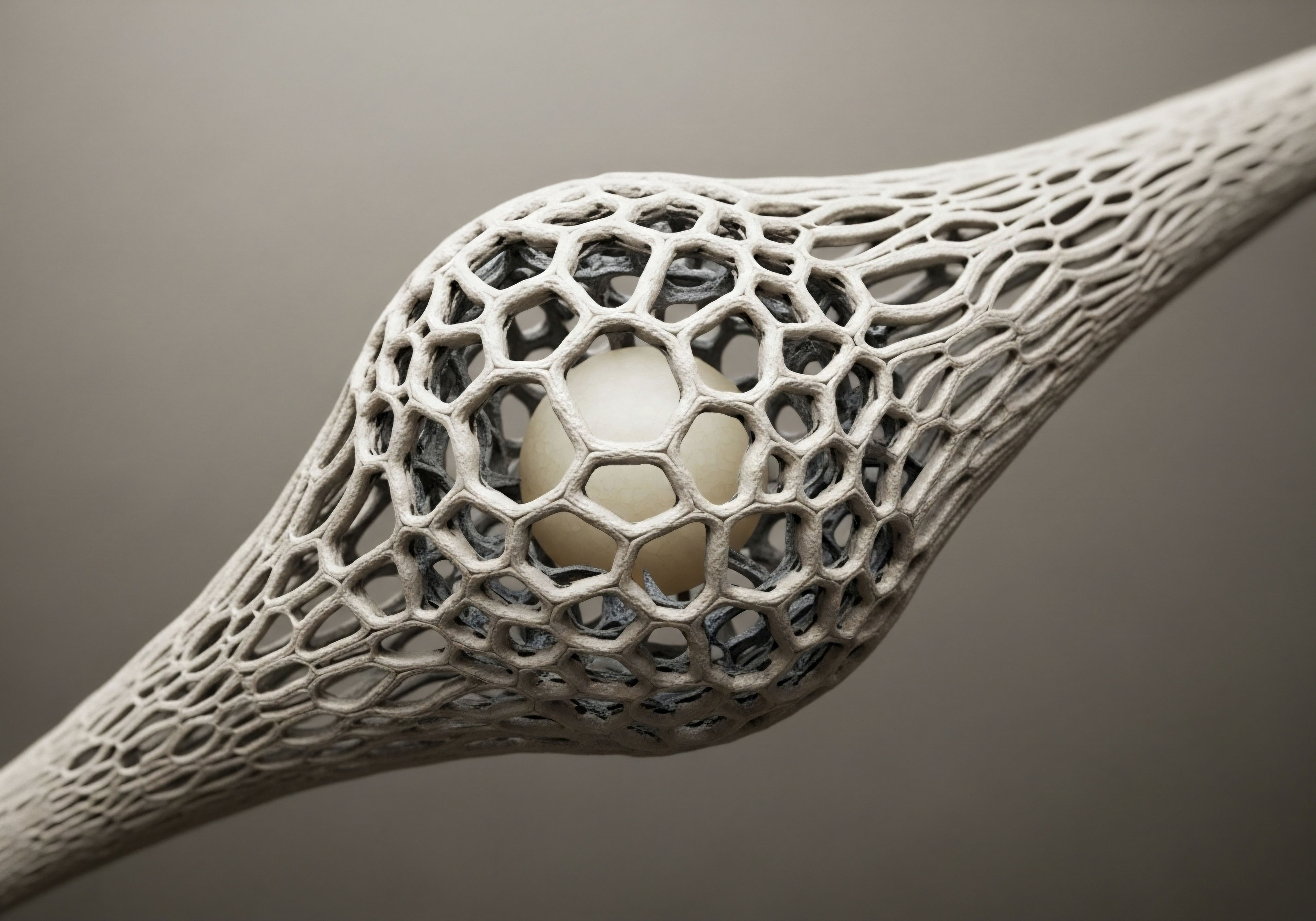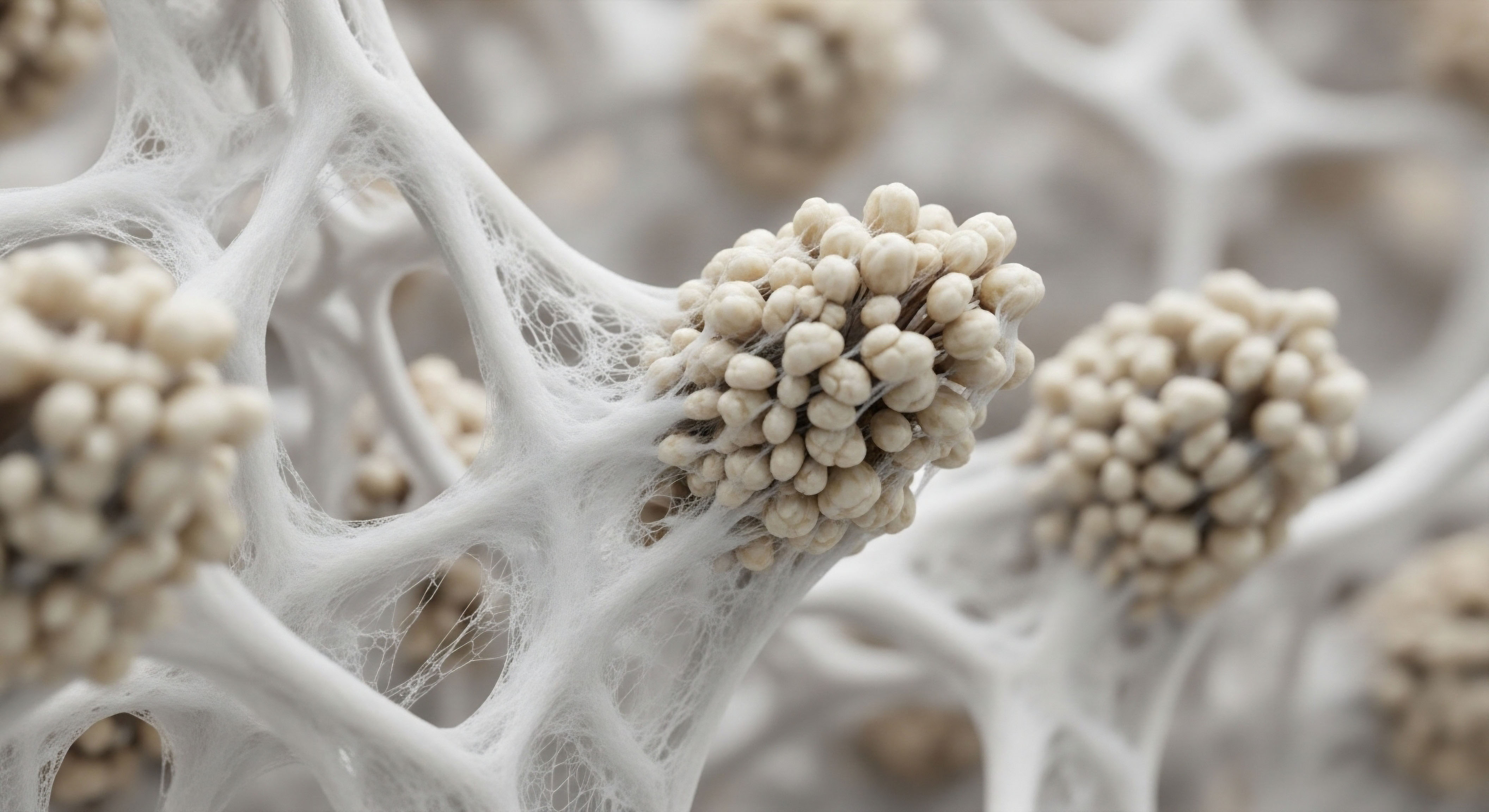

Fundamentals
Experiencing a shift in your vitality, a subtle decline in energy, or a diminished sense of well-being can be disorienting. Many individuals describe a feeling of being “off,” a pervasive fatigue that no amount of rest seems to resolve, or a gradual fading of their innate drive.
These sensations are not merely a sign of aging; they often signal deeper physiological imbalances, particularly within the intricate messaging system of your endocrine network. When these internal signals, like those from testosterone, begin to falter, the impact extends far beyond what many initially perceive, affecting mood, physical capacity, and even cognitive clarity.
Testosterone, often recognized for its role in male physiology, is a vital steroid hormone present in both men and women, albeit in differing concentrations. It orchestrates a symphony of bodily functions, influencing muscle mass, bone density, red blood cell production, libido, and even aspects of mental acuity and emotional stability.
When its levels dip below optimal ranges, whether due to age, lifestyle factors, or underlying health conditions, the body’s internal calibration can become disrupted. This is where a carefully considered approach to hormonal optimization, such as Testosterone Replacement Therapy (TRT), enters the discussion, aiming to restore a more balanced physiological state.
The journey toward hormonal recalibration is deeply personal, yet it is fundamentally rooted in understanding your body’s unique biological systems. While TRT provides a direct means of supplementing testosterone, its effectiveness is not isolated; it is profoundly influenced by the environment within which it operates.
This internal environment is shaped by numerous factors, with dietary choices standing as a particularly powerful determinant. What you consume daily provides the raw materials and regulatory signals that either support or hinder your body’s ability to utilize and respond to exogenous hormones.
Your daily dietary choices significantly influence how your body responds to and benefits from testosterone replacement therapy.
Consider the body as a sophisticated biological machine, where every component requires precise fuel and maintenance. Just as a high-performance vehicle needs specific grades of fuel and regular servicing, your endocrine system requires particular nutrients and a balanced metabolic state to function optimally.
Dietary changes are not simply about weight management; they represent a fundamental lever for modulating inflammation, insulin sensitivity, and the overall metabolic milieu, all of which directly affect how your body processes and responds to hormonal interventions.
The relationship between nutrition and hormonal health is bidirectional. A diet rich in processed foods and inflammatory agents can contribute to hormonal dysregulation, potentially exacerbating symptoms that lead individuals to seek TRT. Conversely, a diet composed of nutrient-dense, whole foods can create a supportive physiological landscape, enhancing the body’s receptivity to testosterone and mitigating potential side effects.
This holistic perspective acknowledges that true vitality stems from a harmonious interplay of all bodily systems, with dietary patterns serving as a foundational element in this complex biological equation.


Intermediate
Understanding the direct impact of specific dietary changes on Testosterone Replacement Therapy outcomes requires a closer look at how macronutrients and micronutrients interact with endocrine pathways. The body’s response to supplemental testosterone is not merely a matter of dosage; it is a complex interplay involving absorption, metabolism, receptor sensitivity, and the conversion of testosterone into other hormones, such as estrogen. Dietary components can significantly modulate these processes, thereby influencing the overall efficacy and safety of TRT protocols.

Macronutrient Balance and Hormonal Metabolism
The proportion of proteins, fats, and carbohydrates in your diet plays a significant role in metabolic health, which in turn affects hormonal balance. Adequate protein intake is essential for synthesizing enzymes and transport proteins involved in hormone metabolism. Healthy fats, particularly saturated and monounsaturated fats, provide the cholesterol precursors necessary for steroid hormone production, including testosterone itself.
Conversely, excessive consumption of refined carbohydrates can lead to insulin resistance, a condition known to negatively impact endogenous testosterone production and overall metabolic function.
For individuals undergoing TRT, maintaining stable blood glucose levels through balanced carbohydrate intake can help optimize insulin sensitivity. Improved insulin sensitivity can enhance the body’s cellular responsiveness, potentially allowing for more efficient utilization of administered testosterone. A diet that minimizes rapid spikes in blood sugar can also help regulate the hypothalamic-pituitary-gonadal (HPG) axis, even when exogenous testosterone is present, by reducing systemic inflammation and oxidative stress.
Balancing macronutrients, especially healthy fats and controlled carbohydrates, supports optimal hormone metabolism and cellular responsiveness during TRT.

Micronutrients and Endocrine Support
Beyond macronutrients, specific vitamins and minerals act as cofactors in numerous enzymatic reactions critical for hormone synthesis, metabolism, and receptor function. Deficiencies in these micronutrients can hinder the body’s ability to process and respond to testosterone effectively.
- Vitamin D ∞ This secosteroid hormone, often obtained through sun exposure and diet, is directly linked to testosterone levels and androgen receptor expression. Adequate vitamin D status can improve the cellular uptake and action of testosterone.
- Zinc ∞ An essential mineral, zinc is a cofactor for enzymes involved in testosterone synthesis and helps prevent its conversion to estrogen. Zinc deficiency has been associated with hypogonadism.
- Magnesium ∞ This mineral plays a role in binding testosterone to its carrier proteins, such as sex hormone-binding globulin (SHBG). Higher magnesium intake has been correlated with increased free testosterone levels.
- Selenium ∞ An antioxidant mineral, selenium supports thyroid function, which is intimately connected with overall metabolic and hormonal health.
- B Vitamins ∞ These vitamins are vital for energy metabolism and neurotransmitter synthesis, indirectly supporting overall endocrine function and stress response.
Consider the following table outlining the impact of various dietary components on TRT outcomes ∞
| Dietary Component | Influence on TRT Outcomes | Mechanism of Action |
|---|---|---|
| Healthy Fats (Monounsaturated, Saturated) | Supports testosterone synthesis and cell membrane integrity. | Provides cholesterol precursors for steroidogenesis; improves cell receptor function. |
| Refined Carbohydrates / Sugars | Can hinder TRT effectiveness; increases inflammation. | Promotes insulin resistance; increases aromatase activity (estrogen conversion). |
| Lean Proteins | Supports muscle protein synthesis and overall metabolic health. | Provides amino acids for tissue repair and enzyme production. |
| Cruciferous Vegetables (e.g. Broccoli) | Aids estrogen metabolism. | Contains Indole-3-Carbinol (I3C) which supports healthy estrogen detoxification pathways. |
| Omega-3 Fatty Acids | Reduces systemic inflammation; supports cardiovascular health. | Modulates inflammatory pathways; improves endothelial function. |
| Processed Foods / Trans Fats | Increases inflammation; negatively impacts metabolic health. | Disrupts cellular function; contributes to oxidative stress. |

Dietary Patterns and Estrogen Management
A significant consideration during TRT, particularly for men, is the potential for testosterone to convert into estrogen via the aromatase enzyme. While some estrogen is necessary, excessive levels can lead to undesirable side effects such as gynecomastia, water retention, and mood fluctuations. Dietary choices can influence aromatase activity.
Foods rich in phytoestrogens, while generally beneficial in moderation, should be considered within the broader context of estrogen balance. Conversely, certain compounds found in vegetables, such as Indole-3-Carbinol (I3C) from cruciferous vegetables, can support healthy estrogen metabolism and detoxification pathways, potentially reducing the need for aromatase inhibitors like Anastrozole or allowing for lower dosages.
The strategic inclusion of specific foods, alongside the prescribed TRT protocol, creates a synergistic effect. For instance, while Anastrozole directly blocks estrogen conversion, a diet that naturally supports estrogen detoxification can complement this action, contributing to a more stable hormonal environment. This integrated approach underscores the principle that therapeutic interventions are most effective when supported by a robust physiological foundation, built significantly through mindful nutrition.


Academic
The influence of specific dietary changes on Testosterone Replacement Therapy outcomes extends to the molecular and cellular levels, impacting the intricate feedback loops and metabolic pathways that govern hormonal homeostasis. While exogenous testosterone directly addresses a deficiency, the body’s internal machinery must be primed to receive, process, and respond to this intervention.
This priming is profoundly shaped by nutritional inputs, affecting everything from androgen receptor sensitivity to the precise regulation of the Hypothalamic-Pituitary-Gonadal (HPG) axis and peripheral hormone metabolism.

Dietary Modulation of Androgen Receptor Sensitivity
The effectiveness of testosterone is not solely determined by its circulating levels but also by the sensitivity of its target tissues to its action. This sensitivity is mediated by androgen receptors, which are proteins located within cells that bind to testosterone and initiate a cascade of genetic and cellular responses.
Dietary factors can modulate the expression and function of these receptors. For example, chronic inflammation, often driven by diets high in refined sugars and unhealthy fats, can downregulate androgen receptor expression or impair their signaling pathways, effectively making cells less responsive to testosterone, even when levels are optimized through TRT.
Conversely, diets rich in antioxidants and anti-inflammatory compounds, such as those found in colorful fruits, vegetables, and omega-3 fatty acids, can support cellular health and receptor integrity. These dietary components help mitigate oxidative stress and reduce systemic inflammation, thereby potentially enhancing the sensitivity of target tissues to testosterone. This means that even with a consistent TRT dosage, an individual’s symptomatic response and physiological adaptations, such as muscle gain or improved mood, can vary significantly based on their dietary landscape.
Dietary patterns influence cellular androgen receptor sensitivity, directly impacting the physiological response to testosterone replacement.

The Gut Microbiome and Hormonal Interplay
An increasingly recognized area of influence is the role of the gut microbiome in hormonal regulation. The trillions of microorganisms residing in the human gut produce a vast array of metabolites that can interact with the endocrine system. The “estrobolome,” a collection of gut bacteria capable of metabolizing estrogens, plays a direct role in regulating circulating estrogen levels.
An imbalanced gut microbiome, or dysbiosis, can lead to altered estrogen metabolism, potentially increasing reabsorption of deconjugated estrogens and contributing to higher circulating estrogen levels.
While TRT introduces exogenous testosterone, its conversion to estrogen remains a significant consideration, especially in men. A healthy gut microbiome, supported by a diet rich in diverse fibers and fermented foods, can promote balanced estrogen detoxification and excretion, thereby complementing the action of aromatase inhibitors like Anastrozole. This intricate connection highlights that optimal TRT outcomes are not just about administering hormones but also about cultivating a supportive internal ecosystem.

Metabolic Health and Aromatase Activity
The conversion of testosterone to estrogen is catalyzed by the aromatase enzyme, which is highly expressed in adipose (fat) tissue. Individuals with higher body fat percentages tend to have increased aromatase activity, leading to greater testosterone-to-estrogen conversion. This metabolic reality underscores why dietary interventions aimed at reducing adiposity are so critical during TRT.
A diet that promotes healthy body composition, characterized by reduced visceral fat, can inherently lower systemic aromatase activity, thereby helping to maintain a more favorable testosterone-to-estrogen ratio.
Insulin resistance, often a consequence of diets high in refined carbohydrates and saturated fats, also directly impacts aromatase. Hyperinsulinemia can upregulate aromatase expression, further driving estrogen conversion. Therefore, dietary strategies that improve insulin sensitivity, such as those emphasizing whole, unprocessed foods, adequate fiber, and balanced macronutrients, serve as a powerful adjunct to TRT. These dietary modifications work synergistically with prescribed medications like Anastrozole, which directly inhibit aromatase, creating a more robust and sustainable hormonal balance.

How Do Dietary Lipids Affect Steroidogenesis Pathways?
Dietary lipids are the fundamental building blocks for steroid hormones. Cholesterol, derived from both endogenous synthesis and dietary intake, is the precursor for all steroid hormones, including testosterone. The type of dietary fats consumed can influence the efficiency of this pathway.
For instance, a diet deficient in healthy fats can limit the availability of cholesterol, potentially impacting the body’s ability to synthesize hormones, even when the HPG axis is stimulated or exogenous testosterone is provided. Conversely, excessive intake of certain unhealthy fats can contribute to cellular dysfunction and inflammation, indirectly impairing steroidogenesis and receptor function.
The fatty acid composition of cell membranes also influences receptor fluidity and signaling. Omega-3 fatty acids, found in fatty fish and flaxseeds, are incorporated into cell membranes, enhancing their fluidity and potentially improving the efficiency of hormone-receptor interactions. This biochemical recalibration at the cellular level can optimize the physiological response to TRT, allowing for a more complete restoration of vitality and function.
| Dietary Factor | Mechanism of Influence on TRT | Clinical Implication |
|---|---|---|
| Chronic Inflammation (Diet-Induced) | Downregulates androgen receptor expression; impairs signaling. | Reduced symptomatic improvement despite adequate testosterone levels. |
| Gut Dysbiosis | Alters estrogen metabolism via the estrobolome. | Increased estrogen reabsorption; potential for estrogenic side effects. |
| High Adiposity (Visceral Fat) | Increases aromatase enzyme activity. | Higher testosterone-to-estrogen conversion; greater need for aromatase inhibitors. |
| Insulin Resistance | Upregulates aromatase expression; impairs cellular responsiveness. | Exacerbates estrogen conversion; reduces TRT efficacy. |
| Micronutrient Deficiencies (e.g. Zinc, Vitamin D) | Impairs enzyme cofactors for hormone synthesis and action. | Suboptimal testosterone production; reduced receptor sensitivity. |
The scientific literature consistently points to a systems-biology perspective ∞ dietary changes are not merely supportive measures but active modulators of TRT outcomes. By addressing the underlying metabolic and inflammatory landscape through precise nutritional strategies, individuals can significantly enhance the therapeutic benefits of testosterone optimization protocols, moving beyond simple symptom management to a more comprehensive restoration of physiological balance.

References
- Volek, J. S. et al. “Effects of a high-fat diet on serum testosterone and cortisol in men.” Journal of the American College of Nutrition, vol. 20, no. 3, 2001, pp. 202-208.
- Pilz, S. et al. “Effect of vitamin D supplementation on testosterone levels in men.” Hormone and Metabolic Research, vol. 43, no. 3, 2011, pp. 223-225.
- Prasad, A. S. et al. “Zinc status and serum testosterone levels in healthy adults.” Nutrition, vol. 12, no. 10, 1996, pp. 684-686.
- Cinar, V. et al. “Effects of magnesium supplementation on testosterone levels of athletes and sedentary subjects at rest and after exhaustion.” Biological Trace Element Research, vol. 140, no. 1, 2011, pp. 18-23.
- Mohamad, N. V. et al. “The relationship between chronic inflammation and androgen receptor expression.” Journal of Endocrinology, vol. 235, no. 2, 2017, pp. R1-R15.
- Ervin, S. M. et al. “The role of the gut microbiome in estrogen metabolism and women’s health.” Journal of Steroid Biochemistry and Molecular Biology, vol. 182, 2018, pp. 10-16.
- Cohen, P. G. et al. “Obesity and estrogen metabolism in men.” Journal of Clinical Endocrinology & Metabolism, vol. 91, no. 4, 2006, pp. 1321-1326.
- Dorgan, J. F. et al. “Effects of dietary fat and fiber on serum hormones and menstrual function in healthy women.” American Journal of Clinical Nutrition, vol. 59, no. 1, 1994, pp. 122-126.

Reflection
As you consider the profound interplay between your dietary choices and the effectiveness of hormonal optimization protocols, remember that this understanding is a powerful tool. It is not merely about following a rigid set of rules; it is about cultivating a deeper awareness of how your body’s internal systems communicate and respond. The insights gained from exploring these connections are the initial steps on a path toward reclaiming your vitality and function.
Your personal health journey is unique, and while scientific principles provide a robust framework, the application of this knowledge requires personalized guidance. This exploration of dietary influences on testosterone replacement therapy is an invitation to view your body not as a collection of isolated symptoms, but as an integrated system capable of remarkable recalibration. What steps will you take to align your daily choices with your aspirations for optimal well-being?



